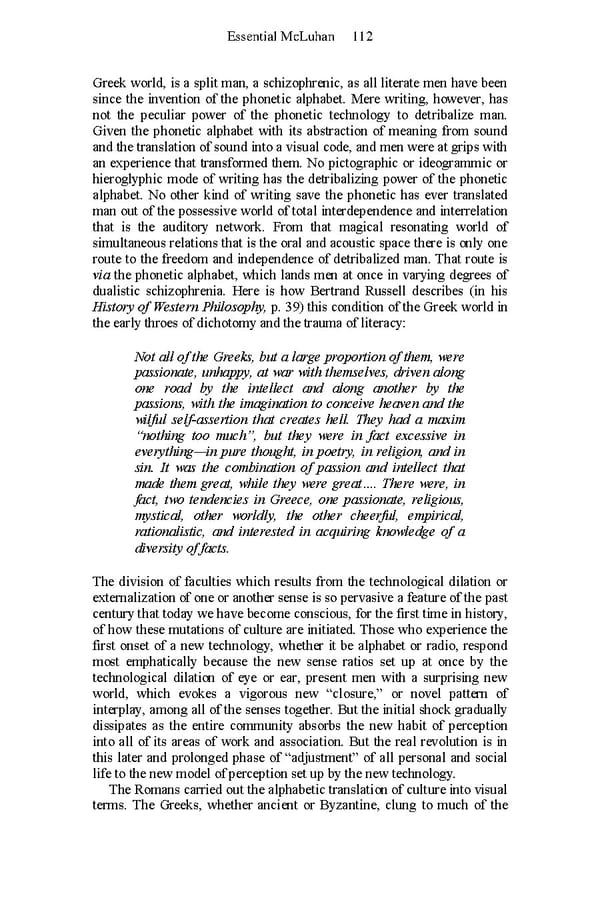Essential McLuhan 112 Greek world, is a split man, a schizophrenic, as all literate men have been since the invention of the phonetic alphabet. Mere writing, however, has not the peculiar power of the phonetic technology to detribalize man. Given the phonetic alphabet with its abstraction of meaning from sound and the translation of sound into a visual code, and men were at grips with an experience that transformed them. No pictographic or ideogrammic or hieroglyphic mode of writing has the detribalizing power of the phonetic alphabet. No other kind of writing save the phonetic has ever translated man out of the possessive world of total interdependence and interrelation that is the auditory network. From that magical resonating world of simultaneous relations that is the oral and acoustic space there is only one route to the freedom and independence of detribalized man. That route is via the phonetic alphabet, which lands men at once in varying degrees of dualistic schizophrenia. Here is how Bertrand Russell describes (in his History of Western Philosophy, p. 39) this condition of the Greek world in the early throes of dichotomy and the trauma of literacy: Not all of the Greeks, but a large proportion of them, were passionate, unhappy, at war with themselves, driven along one road by the intellect and along another by the passions, with the imagination to conceive heaven and the wilful self-assertion that creates hell. They had a maxim “nothing too much”, but they were in fact excessive in everything—in pure thought, in poetry, in religion, and in sin. It was the combination of passion and intellect that made them great, while they were great…. There were, in fact, two tendencies in Greece, one passionate, religious, mystical, other worldly, the other cheerful, empirical, rationalistic, and interested in acquiring knowledge of a diversity of facts. The division of faculties which results from the technological dilation or externalization of one or another sense is so pervasive a feature of the past century that today we have become conscious, for the first time in history, of how these mutations of culture are initiated. Those who experience the first onset of a new technology, whether it be alphabet or radio, respond most emphatically because the new sense ratios set up at once by the technological dilation of eye or ear, present men with a surprising new world, which evokes a vigorous new “closure,” or novel pattern of interplay, among all of the senses together. But the initial shock gradually dissipates as the entire community absorbs the new habit of perception into all of its areas of work and association. But the real revolution is in this later and prolonged phase of “adjustment” of all personal and social life to the new model of perception set up by the new technology. The Romans carried out the alphabetic translation of culture into visual terms. The Greeks, whether ancient or Byzantine, clung to much of the
 Essential McLuhan Page 118 Page 120
Essential McLuhan Page 118 Page 120